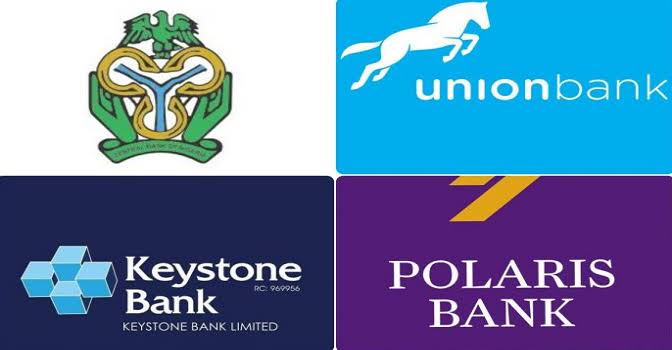* Union Bank Will Inform General Public Of Next Steps In Due Course-Spokesperson
This may not be the best of times for the Nigerian Deposit Money Banks, (DMBs) as they seem to be flurry of activities that is causing disquiet in the industry.
By Monday, July 14, the window for regulatory forbearance would close and commercial banks are scrambling to meet the Central Bank of Nigeria’s (CBN) deadline for submission of Capital Restoration Plans.
This is as the apex bank moves to phase out the regulatory forbearance regime introduced during the COVID-19 pandemic, to pave way for a smooth and orderly transition back to full prudential compliance.
Similarly, with about eight months to meeting CBN’s capital requirement thresholds, most banks, particularly the tier three ones and the three government owned banks, through CBN, Keystone, Polaris and Union have yet to come out with any plans and neither has any policy pronouncement for their future being made.
The banks, which are cureently operating at the tail end of the market, were not forthcoming on how they intend to navigate through, what some analysts regard as difficult and near impossible path.
This is even as their acquisition or merger processes are allegedly shrouded in secrecy.
However, in its response to metrobusinessnews.com (MBN) inquiry, Ayotunde Omolayole wrote, “Thanks for your interest in our financial institution. I’m not in a position to answer your enquiry but be assured that in due course, Union Bank will duly inform the general public of its next steps.”
Afrinvest Research in its half-year review, said that “The likes of Union Bank, Polaris Bank, and Keystone Bank (which is now under the control of the Federal Government through the CBN have yet to indicate publicly any recapitalisation moves.
Unity Bank is in a merger with Providus Bank and has secured a N700bn financial accommodation from the CBN. However, the new entity must raise additional funds to retain its national banking license.
Meanwhile, the outlook for tier-3 banks like Globus, Standard Chartered, Nova, Titan Trust Premium Trust Optimus, and Citibank Nigeria appears to be mergers and acquisitions, even though there have been no overt gestures yet.”
READ ALSO;CBN’s Report On Surging Financial Fraud On Digital Channels Puts SEC, Others Under Scrutiny
International rating agency Fitch Ratings also reiterated in at least two commentaries that M&As were very likely for smaller banks in the country.
In a February report, the global credit rating agency stated that while tier-1 and tier-2 banks have made notable progress in raising fresh capital, tier-3 lenders have been slow in their recapitalisation efforts, making consolidation or license downgrades a more likely path to compliance.
It noted, “M&A activity and license downgrades remain more likely among third-tier banks.”
With the likes of Zenith, Access, GTbank, Ecobank , Jaiz and Lotus banks that have made substantial progress, the coast may be getting clearer for most of the tiers one and two banks
In March 2024, the CBN directed commercial banks with international authorisation to increase their capital base to N500bn and national banks to N200bn, while those with regional authorisation are expected to achieve a N50bn capital floor.
Similarly, non-interest banks with national and regional authorisations will need to increase their capital to N20bn and N10bn, respectively. CBN gave the banks a deadline of March 2026.
Although record achievements have been made by some banks, the analysts say, however that with less than nine months to go, some banks have resigned to fate, hoping for either operation downgrades or the popular M&A options.
The analysts have expressed optimism for the industry, especially in light of the recent directive from CBN on forbearance exposures and Single Obligor Limits.
According to them, besides the much applauded recapitalisation exercise, the apex bank has intensified its supervisory oversight, through recently mandating that banks fully exit forbearance loans as a condition for future dividend payments.
This directive, according to them, underscores the regulator’s commitment to enhancing asset quality, enforcing capital discipline and strengthening banks’ capacity to take on quality risk and sustain long-term return on equity.
The CBN’s directive, issued in June, is part of a broader strategy to reinforce capital buffers, enhance balance sheet resilience, and ensure prudent capital retention across the banking sector.
The regulatory forbearance, which allowed banks temporary relief from certain prudential requirements, is now being wound down in a structured and supervised manner.
“To complement the above measures and ensure forward-looking capital planning, all affected banks are required to prepare and submit a comprehensive Capital Restoration Plan to the CBN on or before the 10th working day following the end of the quarter, with effect from June 30, 2025,” the CBN stated in a circular.
The 10th working day falls on Monday, July 14, 2025.
